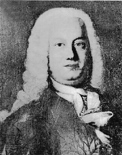

Italian composer. As a chorister at St. Mark's, Venice, he was probably educated in music by maestro di cappellaLegrenzi. In 1693 and 1699 he published two collections of trio sonatas (opp. 1 and 2); also in 1699 he was appointed maestro di cappellafor Duke Ferdinando Carlo of Mantua. There he composed operas (L'oracolo in sogno,1699; Opera pastorale,1701; Paride sull'Ida,1704) that received lavish productions. During his tenure as maestrofor Prince Ruspoli in Rome (beginning 1709), he composed 150 solo cantatas (some for Emperor Joseph I and for Cardinal Ottoboni). When Marc'Antonio Ziani, the imperial Kapellmeister,died in 17l5, J. J. Fux succeeded him; the following year Caldara was appointed by the new emperor, Charles VI, to assume Fux's former position as Vice-Kapellmeister.This position required Caldara to compose operas and oratorios for a great many court celebrations (name days, birthdays, weddings); in return, the composer demanded of the emperor an ever larger salary. By 1729 he was receiving 3,900 florins, more than Fux's salary. Caldara composed nearly 100 operas, 43 known oratorios, cantatas, Masses, madrigals, and canons.